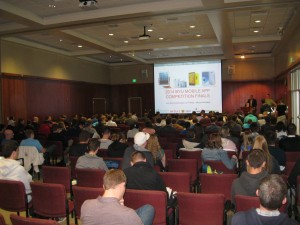
BYU students are combining innovation and practical application to create mobile apps ready for iPhones and iPads to download all over the world.
The Rollins Center for Entrepreneurship and Technology announced the winners of BYU’s fifth annual Mobile App Competition at a packed event Friday afternoon.
Eighteen teams competed against each other for $15,000 in prize money for the most innovative and effective app designs by BYU students. First place went to My Home Story app, second to Card Table app and third-place honors to Sadie O’Green and Mathbot apps.
“One of the best ways to learn is by doing, and that’s what our competition incentivizes,” said Stephen Liddle, academic director for the Rollins Center for Entrepreneurship and Technology, in a press release issued by the college. “The competition is a way for us to encourage students to explore the interesting and relevant space of mobile app development.”
Programmers, app designers, potential employers and well-wishers packed the fourth-floor conference room at the Tanner Building to watch teams present their products and be inspired for future competitions.
Mobile apps ranging from card games, decision-making platforms, study group creators and bargain shopping platforms were pitched by their designers in front of a three-judge panel.
“They are doing things here that others get paid a lot of money to do,” said judge Joshua Aikens, complimenting the teams’ abilities and skill development in a press release from the Marriott School of Business.
As a technology representative from Rocketmade in St. George, Aikens was one of several employers who attended the event to examine BYU’s talent pool and search for qualified developers for future employment.
The $3,000 first-place award went to My Home Story, an app that allows homebuilders to showcase a home’s development to the new owner or buyer throughout the construction process. Creator Matthew McCarthy, a 24-year-old senior from Sandy majoring in physics, said the app has been an enormous boost to his family’s construction business. Referrals to his family’s company have increased 400 percent after adapting the app into their business strategy.
“It was the most cheap option for builders and drives up traffic,” McCarthy said. “People love sharing photos of their new home.”
The My Home Story app has been featured in a construction magazine and has attracted significant interest from other construction companies. McCarthy said the team spent about a month designing the app, as well as three to four months beforehand learning the process.
McCarthy, minoring in computer science, recommended that future competitors join Cocoaheads, a club of student designers who meet regularly on campus to help each other develop their programming skills.
Second place and $2,500 was awarded to Card Table, a game that creates a virtual card table with an iPad and individual players’ iPhones. Up to four players can “draw” a hand from the central iPad, “hold” the cards on their iPhone (or iPod touch) and lay them down onto the virtual iPad’s tabletop to play whatever card game they desire. The game is enabled by wireless internet or Bluetooth technology. It impressed the judges with its advanced design and interactivity.
Third-place honors were presented to a story book app, called Sadie O’Green, and Mathbot, a virtual app that teaches algebra to kids, according to the press release. Both teams received a $2,000 cash prize.
Another team, Lunchbox, provided ten pizzas free of charge in addition to showcasing its latest app that features college campus events offering free food.
Overall, the judges were impressed by the quality and range of the entries.
Each of the participating teams that submitted a completed app received a portion of the $15,000 awarded in the competition, further incentivizing development and mobile app design.
The average salary of a mobile app developer is $97,000, and designers with a bit more experience can expect to be earning $127,000 within several years, event organizers said.
Students interested in participating in next year’s Mobile App event can find additional information and view past winners at mobileapp.byu.edu.




